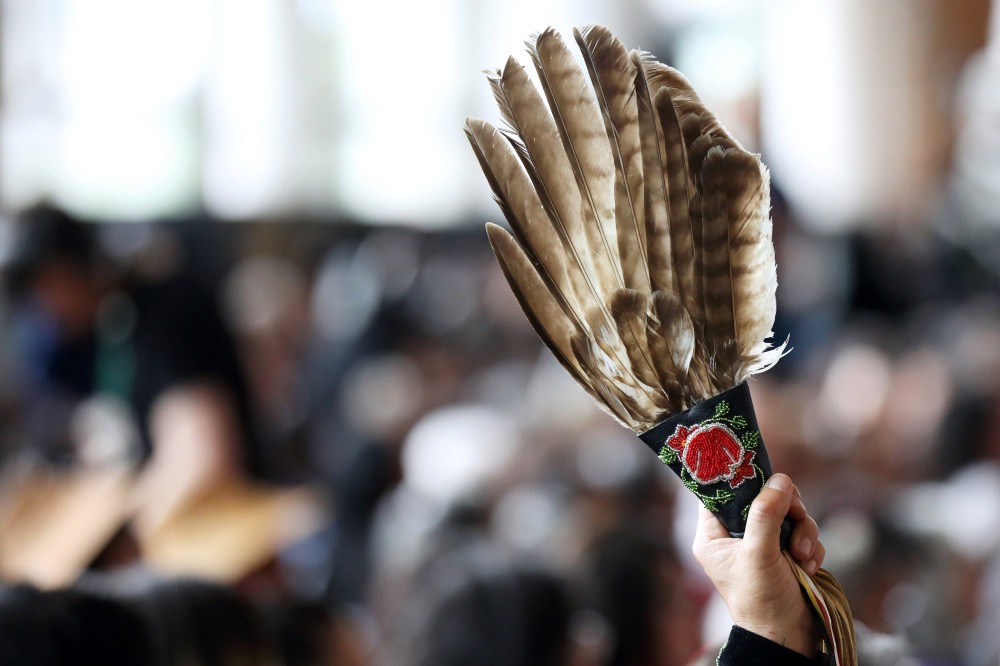Toronto, Canada
Thomson Reuters Foundation
As Americans protest the deaths of George Floyd, Breonna Taylor and other black people at the hands of police, Canadians are facing a reckoning of their own.
Since April, six Indigenous people have been fatally shot by police, including a woman killed during a “wellness check,” and a video went viral of a First Nations chief being beaten by Royal Canadian Mounted Police officers in March.

A woman holds an eagle feathers during the closing ceremony of the National Inquiry into Missing and Murdered Indigenous Women and Girls in Gatineau, Quebec, Canada, on 3rd June, 2019. PICTURE: Reuters/Chris Wattie/File photo
Race troubles in Canadian policing have been thrust into the spotlight in recent weeks, following the global Black Lives Matters protests and the succession of cases of police violence against Indigenous people.
“There is systemic racism in Canada,” said Prime Minister Justin Trudeau at a news conference this month, calling for investigations into the recent cases to be made public.
“It means that Indigenous peoples, Black Canadians and racialised Canadians are far more likely to suffer violence at the hands of the authorities and police than non-racialised Canadians,” he said.
In the decade spanning 2007 to 2017, Indigenous people accounted for more than a third of people shot to death by RCMP officers, despite numbering just five per cent of the population.
A study in Nova Scotia found black residents were six times more likely to be subjected to street checks than were white people.
Among those slain since April, Chantel Moore was killed in New Brunswick after police were called to her apartment to check on her well-being.
Police say she attacked an officer with a knife, but her family questioned why non-lethal force was not used to subdue her.
A week later, Rodney Levi was shot and killed when the RCMP were called to remove him from a church minister’s barbecue and said he was carrying knives.
The chief of his Indigenous community said on Facebook that Levi had mental health issues.
In Alberta, video footage showed Athabasca Chipewyan First Nations Chief Allan Adam being punched, tackled and choked during his arrest over an expired license plate.
RCMP Commissioner Brenda Lucki released a statement acknowledging “systemic racism” in the police force, after initially refusing to use the term.
The RCMP is omnipresent, operating federally across the country and also contracted to serve by eight out of 10 provinces, the three territories and 153 municipalities.
As in the United States, calls are growing to demilitarize police and reallocate funds to community-oriented supports such as mental health and housing.
“We need to figure out how we deconstruct that combative and aggressive culture that exists within police forces,” said Chief Arlen Dumas, Grand Chief of the Assembly of Manitoba Chiefs.
Dumas advocates police body cameras and an emphasis on de-escalation of potentially violent confrontations.
Other recommendations being considered include installing veteran detectives and specialised Indigenous policing units.
Officers frequently work with Indigenous communities for only two years and don’t speak the language, said Rebecca Kudloo, president of Pauktuutit Inuit Women of Canada, an advocacy organisation.
Recently publicised letters of complaint from a legal aid board found women in the territory suffered violence and racism at the hands of the RCMP.
In the letters obtained by the Canadian Broadcasting Corporation, the board said Indigenous women were forced to undergo “humiliating and degrading” strip-searches by RCMP officers.
The RCMP in Nunavut said its commanding officer was aware of the complaints and was awaiting completion of a review into the allegations.
Relations between the RCMP and Indigenous communities can be traced to its origins as a paramilitary colonial force in the 1870s, said Steve Hewitt, senior history lecturer at the University of Birmingham.
“Mounties” moved Indigenous people forcibly onto reservations and removed Indigenous children from their families to attend residential schools, a policy intended to assimilate them into Euro-Canadian culture.
Hewitt suggested starting over, as in Northern Ireland where the sectarian Royal Ulster Constabulary was replaced by a new police force to help ease partisan troubles.
“I just think the whole thing is rotten to the core,” he said.
Former RCMP officer Chad Haggerty told the Thomson Reuters Foundation that when he was on the force in Alberta, insults by colleagues about Indigenous people like himself were “as common as coffee.”
One officer said “I was hired because I was an Indian and I should be back on the reserve policing,” said Haggerty, who served for 17 years and works at a law firm.
In Manitoba, a law-enforcement program at the University College of the North is trying to get more Indigenous people into policing and teach approaches such as community problem-solving.
“When you put that uniform on, it represents a lot of things that First Nations people don’t agree with,” said Chris Pallan, an Indigenous former RCMP officer who runs the program.
He recalled a community elder calling police “the people that take our children away.”
“People don’t forget that,” he said.





